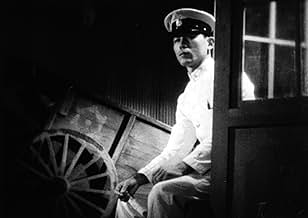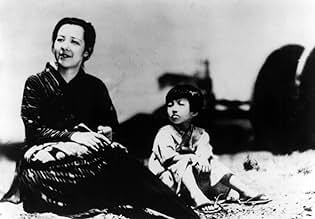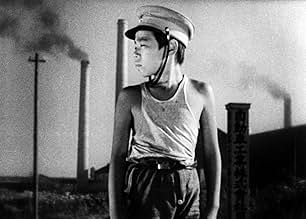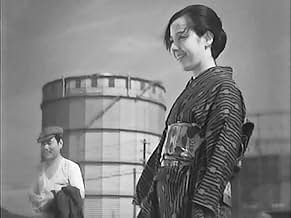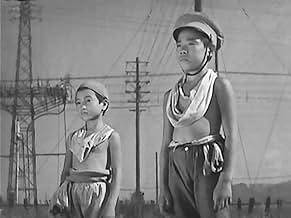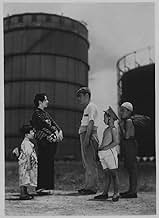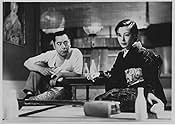IMDb-BEWERTUNG
7,4/10
1772
IHRE BEWERTUNG
Füge eine Handlung in deiner Sprache hinzuUnemployed Kihachi and his two sons struggle to make ends meet. But that doesn't keep Kihachi from wooing single mother Otaka.Unemployed Kihachi and his two sons struggle to make ends meet. But that doesn't keep Kihachi from wooing single mother Otaka.Unemployed Kihachi and his two sons struggle to make ends meet. But that doesn't keep Kihachi from wooing single mother Otaka.
- Regie
- Drehbuch
- Hauptbesetzung
Empfohlene Bewertungen
10mgmax
The richly moving story of a hard-luck father and his two children, this masterpiece of unadorned realism may remind you more of Italian films like Shoeshine than Ozu's more staid work of the 50s. (The inspiration was probably Vidor's The Crowd, and a comparison with that masterpiece is by no means out of order.)
*** I SUMMERIZE THE GENERAL PLOT OF THE FILM AT LENGTH. NARRATIVE SPOILERS AHEAD ***
A man and two boys are seen walking along one of the many lonesome, dusty roads that exist inside the world of Ozu. They are shot from a low angle and against the monumental sky. They are like lone sailors lost at sea.
There is no work for the father (Kihachi), despite the numerous, booming factories, and so there is no food for the young, scrawny boys (Zenko and Masako). They are doomed from the start; trapped in a gray malaise and where luxury exists just out of reach.
Beautiful things happen in the in-between moments of Ozu's films. In his silent films, they usually happen in a field. There is an early scene in this film, where the boys and their father pantomime a rich feast full of fluffy, white rice and endless sake. This short reprieve from hopelessness is heaven for them, and we see them smile for the first time in the film's opening twenty minutes.
But the scene is much more beautiful still, because of the sorrowful, scoring of strings that accompany the images. Ozu may let his characters forget, for a while, their troubles, but he certainly doesn't intend for us to. This dichotomy between what we feel and what the characters feel creates an arresting sense of poignancy. Their temporary enjoyment is not meant for us.
The trio eventually catches a break, one presented to them by an old friend of Kihachi. She is a woman named Otsune with whom he used to kick up trouble. She is now reformed. She is running a restaurant and is able to dig up some work for Kihachi. The next ten days, he says, are the happiest of his life.
Things are complicated by Otaka, an impoverished single mother whose child has grown ill with dysentery. The two, fragmented families have met along their shared but separate paths of economic struggle. Kihachi has grown fond of the mother and the boys enjoy the company of her cherubic daughter. In an effort to repair his broken family, and because he has fallen in love, Kihuchi steals a large sum of money from a local officer to pay for the child's treatment, before turning himself in.
An Inn in Tokyo plays as a series of isolated moments in a bitter life full of cruel ironies. Even so, Ozu imbues a strong poetic beauty (in terms of how he frames this misery) within his social realism that allows the film to effectively absorb the viewer. The film succeeds in not simply drowning in its sea of anguish, but instead by providing a lens through which to see the unexpected moments of joy that go along with it.
A man and two boys are seen walking along one of the many lonesome, dusty roads that exist inside the world of Ozu. They are shot from a low angle and against the monumental sky. They are like lone sailors lost at sea.
There is no work for the father (Kihachi), despite the numerous, booming factories, and so there is no food for the young, scrawny boys (Zenko and Masako). They are doomed from the start; trapped in a gray malaise and where luxury exists just out of reach.
Beautiful things happen in the in-between moments of Ozu's films. In his silent films, they usually happen in a field. There is an early scene in this film, where the boys and their father pantomime a rich feast full of fluffy, white rice and endless sake. This short reprieve from hopelessness is heaven for them, and we see them smile for the first time in the film's opening twenty minutes.
But the scene is much more beautiful still, because of the sorrowful, scoring of strings that accompany the images. Ozu may let his characters forget, for a while, their troubles, but he certainly doesn't intend for us to. This dichotomy between what we feel and what the characters feel creates an arresting sense of poignancy. Their temporary enjoyment is not meant for us.
The trio eventually catches a break, one presented to them by an old friend of Kihachi. She is a woman named Otsune with whom he used to kick up trouble. She is now reformed. She is running a restaurant and is able to dig up some work for Kihachi. The next ten days, he says, are the happiest of his life.
Things are complicated by Otaka, an impoverished single mother whose child has grown ill with dysentery. The two, fragmented families have met along their shared but separate paths of economic struggle. Kihachi has grown fond of the mother and the boys enjoy the company of her cherubic daughter. In an effort to repair his broken family, and because he has fallen in love, Kihuchi steals a large sum of money from a local officer to pay for the child's treatment, before turning himself in.
An Inn in Tokyo plays as a series of isolated moments in a bitter life full of cruel ironies. Even so, Ozu imbues a strong poetic beauty (in terms of how he frames this misery) within his social realism that allows the film to effectively absorb the viewer. The film succeeds in not simply drowning in its sea of anguish, but instead by providing a lens through which to see the unexpected moments of joy that go along with it.
This early great work from The Master is a sobering melodrama honed squarely on a single unemployed, homeless father struggling to feed and shelter his two sons. Ozu does a fine job capturing the dynamic between the two boys by themselves and with their father, but the film really gets interesting when two women enter the story: a young single mother, also homeless, and an old friend who finds the father a job. The maudlin climax seems to anticipate Ford's GRAPES OF WRATH and DeSican melodrama -- though in the wrong ways -- but prior to that Ozu comes up with an quirky expressionist sequence to reflect the father's unraveling moral state.
Ozu was really on the verge of discovery at the time, having experimented for a few years. I believe this is why he continued in the silent format longer than his peers, fearing sound would pose demands on the visual experience he was hoping to cultivate. So he was looking for an eye that is quiet but attentive, alert, seeing with a kind of vital emptiness.
Focus would be his exercise. In place of more rigorous form, he had discovered a few motifs he knew carried resonance - vast rolling skies, floating weeds, fireworks - and was content to use that as spontaneous blossoms of insight amid languid flows.
And he had an optimism that was touching, faith in a secular way. His characters really grew to a point of sublime selflessness but did so out of common sense and remained distraught, human.
So there is a lot of sense in early Ozu, in both meanings of the word, and this is why I value him.
But I wish he was bolder at the same time. And this is because the first 30 minutes are unusually sparse, even by standards he was developing, and just look at how simply he paints contemporary Japan with one stroke, a father with two raggedy kids to feed, unemployed in the middle of a sunbaked plain littered with factories, but in the latter stages turns into conventional drama that resolves theatrically, and even worse is a rehash of his Floating Weeds from the previous year.
So he was finding ways to handle emptiness but was still thinking in terms of balanced, old-fashioned storytelling. His eye was looking to see clearly but did not see itself.
The juxtaposition is striking and disappoints more, especially by comparison to the likes of Mizoguchi and Naruse who were coming up with clever ways to annotate the artifice of their melodrama. Ozu's unfolds at face value, provincial in its earnestness.
Asymmetry is what is lacking here. Imbalance that reflects a world unfettered by narratives.
Focus would be his exercise. In place of more rigorous form, he had discovered a few motifs he knew carried resonance - vast rolling skies, floating weeds, fireworks - and was content to use that as spontaneous blossoms of insight amid languid flows.
And he had an optimism that was touching, faith in a secular way. His characters really grew to a point of sublime selflessness but did so out of common sense and remained distraught, human.
So there is a lot of sense in early Ozu, in both meanings of the word, and this is why I value him.
But I wish he was bolder at the same time. And this is because the first 30 minutes are unusually sparse, even by standards he was developing, and just look at how simply he paints contemporary Japan with one stroke, a father with two raggedy kids to feed, unemployed in the middle of a sunbaked plain littered with factories, but in the latter stages turns into conventional drama that resolves theatrically, and even worse is a rehash of his Floating Weeds from the previous year.
So he was finding ways to handle emptiness but was still thinking in terms of balanced, old-fashioned storytelling. His eye was looking to see clearly but did not see itself.
The juxtaposition is striking and disappoints more, especially by comparison to the likes of Mizoguchi and Naruse who were coming up with clever ways to annotate the artifice of their melodrama. Ozu's unfolds at face value, provincial in its earnestness.
Asymmetry is what is lacking here. Imbalance that reflects a world unfettered by narratives.
This film deals with an unemployed man and his two sons who rover through the industrial areas of Tokyo during the depression in the search for work.
After some bad luck the father is able to find a job but then the pity for a single mother and her sick little daughter makes him do something he should not have done.
This is the very simple story but this is not what makes the film a masterpiece. The great achievement is that Ozu shows how poverty affects the human mind. He depicts the fear and the feeling of senselessness in a way that nobody else has ever done. Many of the devices him employs are very imaginative. Many people might compare this film to de Sica's "Ladri di biciclette" which was made 12 years later. But without doing a disservice to de Sica's masterpiece: "Tokyo no yado" is the best film that was ever made about poverty and unemployment,
After some bad luck the father is able to find a job but then the pity for a single mother and her sick little daughter makes him do something he should not have done.
This is the very simple story but this is not what makes the film a masterpiece. The great achievement is that Ozu shows how poverty affects the human mind. He depicts the fear and the feeling of senselessness in a way that nobody else has ever done. Many of the devices him employs are very imaginative. Many people might compare this film to de Sica's "Ladri di biciclette" which was made 12 years later. But without doing a disservice to de Sica's masterpiece: "Tokyo no yado" is the best film that was ever made about poverty and unemployment,
Wusstest du schon
- WissenswertesThe credits indicate that the script was based on an original work by a foreign writer with a name that sounds like "Winzart Monet", but it is actually a gag name, derived from "without money".
- VerbindungenFeatured in A Story of Children and Film (2013)
Top-Auswahl
Melde dich zum Bewerten an und greife auf die Watchlist für personalisierte Empfehlungen zu.
Details
- Laufzeit
- 1 Std. 19 Min.(79 min)
- Farbe
- Sound-Mix
- Seitenverhältnis
- 1.37 : 1
Zu dieser Seite beitragen
Bearbeitung vorschlagen oder fehlenden Inhalt hinzufügen

